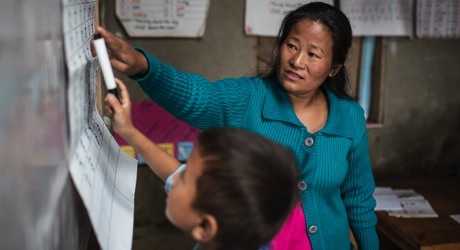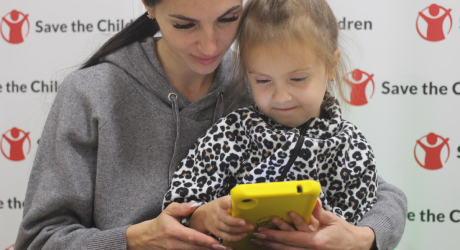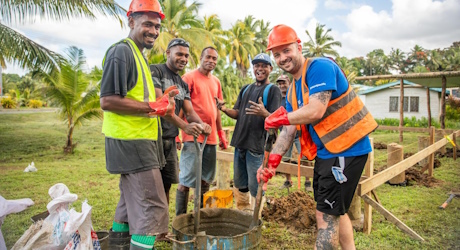Footprints Project
Since 2005, travelers like you have helped us change the world through micro-donations.

-
A total of
7600
Travelers
-
donated
$20003.21
(100% funded) -
to help improve
Education
-
in
Nepal
Program Background
Nepal faces large disparities in literacy rates between urban and rural areas, with urban areas recording literacy rates of approximately 73%, but only reaching 43% on average in rural areas. In addition, teachers in rural Nepal receive little or no training and regularly resort to basic rote-learning methods. As a result, attendance rates by teachers and students alike are poor, and schools are very inadequately resourced. These conditions mean that in rural Nepal today, many children do not attend primary school regularly and less than half of the children enrolled in primary school go on to complete secondary school.
The TTQE program aims to reduce poverty and provide livelihood opportunities through a number of key objectives focused on ensuring that disadvantaged communities in the Lower Solu Khumbu receive a quality education. These are:
- Improved teacher and student attendance
- Increased female enrolment rates
- Reduced drop out rates
- Improved literacy rates
- Enhanced community support for primary education
- Development of child centered teacher-training methods
- Provision of appropriate teaching materials and critical school supplies
- Sustainability of the program by ensuring that key teachers are identified and trained for ongoing classroom support and training throughout the region

The TTQE program now operates in every single district and reaches every single school in the lower Solu Khumbu region. This achievement is part of a twelve-year vision the AHF had for the region - one aimed squarely at improving the quality of and the access to a life changing education.
One of only two teacher training programs formally accredited by the Nepal Department of Education, the twelve-year TTQE program has been described as one of the most comprehensive programs undertaken in rural Nepal.
Key Outcomes
To assist communities in the wake of the devastating earthquakes, several new workshops were introduced in 2015:
- Psycho-social counselling and training was provided to 1,600 teachers to help children and families suffering from the trauma.
- An art-therapy camp was attended by more than 330 students and teachers from across the region. Recipients of the AHF Art Award facilitated this 5-day workshop using art therapy to provide post-earthquake counselling. Feedback from the workshop was very positive.
- Training on disaster preparedness was delivered to schools and communities.
- Training of local people in masonry and skilled construction work was provided to enable community members to assist in the rebuild program.
Regular training workshops continued throughout the entire lower Solu Khumbu region in 2015. These workshops, which are the backbone of the TTQE program, provide essential training for teachers. All workshops and training are provided “in the field”. With your support the AHF delivered:
- Key teacher training workshops and collaborative sessions for 72 key teachers across the region. By identifying outstanding teachers and developing their skills, the AHF has developed a cadre of Nepalese teacher trainers, or key teachers, to promote the sustainability of the program and ensure that the program is taken up at a local level and owned by local communities.
- The continuation of basic training workshops in Necha and Kerung, the areas where the AHF commenced teacher training in 2014. In 2015, 425 teachers attended these workshops. Teachers often walk for several days from their village to attend these 10-day workshops.
- Refresher training workshops for 916 teachers held in 13 different locations in the lower Solu Khumbu region. These are shorter workshops with trainers visiting a cluster of schools so that the trainers can work more closely with the teachers on the ground.

The workshops are supported by a number of other integrated elements of the TTQE program. In 2015 the AHF also provided:
- In school support to teachers in 268 schools who received assistance three times a year from AHF trainers. These support visits enable trainers to observe teachers in the classroom and provide instant feedback.
- 11 community support workshops throughout the region to promote the value of education, particularly to parents whose children do not regularly attend school. Over 8,000 parents, guardians and beneficiaries attended these workshops. AHF staff also work closely with local community groups, radio stations and parent and teacher associations.
- Educational resources, in the form of basic school supplies, were provided to 266 schools. Reading books were provided to 137 schools and ten schools received child-friendly furniture, such as desks and chairs.
- Scholarships were provided to 500 students, including 351 girls from economically disadvantaged families, to encourage them to attend school. An extra fifty scholarships were scoped in Necha and Kerung and will be awarded in 2016.
- The participation of 13 volunteer teachers from Australia and New Zealand, who provide valuable training assistance and mentoring to teacher trainers. Trainers also received early childhood development training and psycho-social counseling training.
- 98 child clubs, which were established to promote awareness of child rights, reading skills, and child protection, met during the year. Learning camps also provided extra classes for students from marginalized and poor backgrounds.
Overall, the program continued to achieve some key objectives in 2015:
- Educational outcomes for primary school students in the lower Solu Khumbu improved by 4.46% in 2015.
- 100% of teachers attended refresher training, with an overall participation rate of 87% across all workshops.
- Key teachers are now recognised and appointed by the Department of Education.
- An increase in the enrolment of girls by .57%, one of the key focus areas of theprogram, and 0.54% of students with a disability benefited from the program.
- Reduction in drop-out rates from a high of 5.3% in 2014 to 3.6% in 2015
- Strengthening of program partner’s capabilities with a new management team which has improved program quality, financial management and monitoring and evaluation.
Whats next?
Continuing to work with the National Centre for Education Development in Nepal regarding the future roll out of the TTQE program beyond the Solu Khumbu.
By the end of 2017 the AHF will have trained teachers from over 307 schools in five different districts and will have provided a quality education to more than 35,000 students from disadvantaged communities. The organisation now operates in every single district in the lower Solu Khumbu region.
The AHF have targeted a number of initiatives to be introduced in 2016 to help achieve the desired outcomes. These include:
- Introducing vocational training scholarships that offer training for older, high school aged children. These scholarships will seek to increase the capacity of youth to become trained workers, providing them with employable skills and the opportunity to be leaders within their communities. The training would be made available for students at a high school level, either in school or for those who have dropped out, providing skills in practical trades such as nursing, dentistry, masonry and agricultural trades.
- Increasing home visits and counseling of parents to increase attendance rates.
- Focusing on developing the academic progress of key teachers and develop district key teacher teams.
- Improving monitoring and reporting and working with head teachers to adopt common standards
- Targeting under performing schools and closely monitoring teachers to encourage better outcomes
- An external evaluation of all aspects of the TTQE program will be carried out in 2016.
- Expanding the scholarship program to Necha and Kerung and providing additional scholarships to other regions to families who have suffered adversely as a result of the earthquakes.
Traveling soon? When you buy travel insurance with us, you can make a contribution towards a cause you care about.
Get a quote







